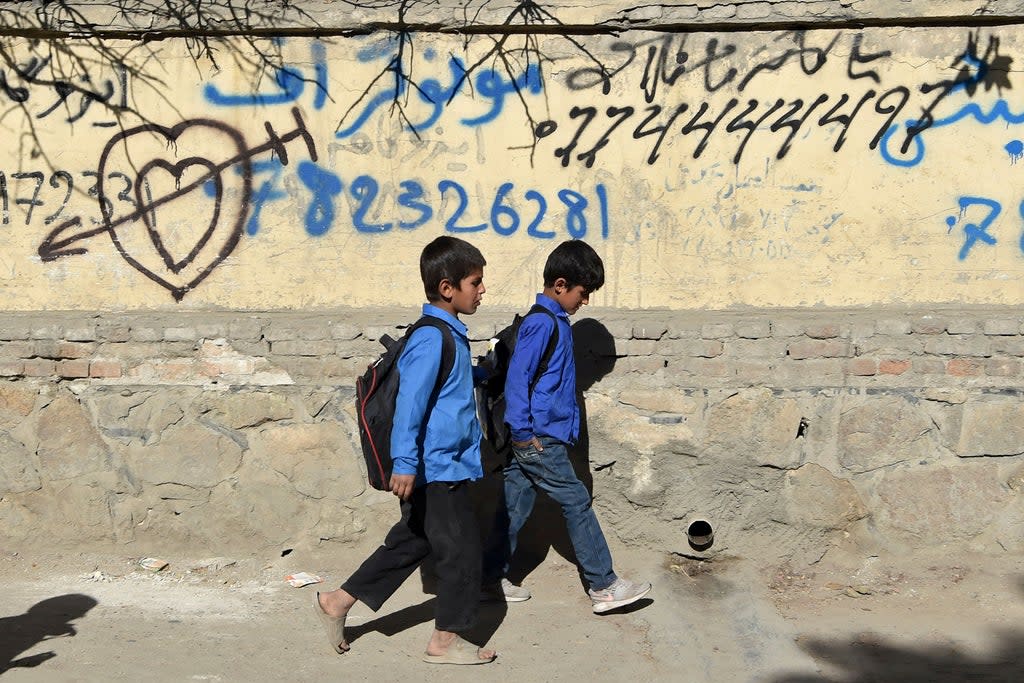The news cycle may have moved on but the people of Afghanistan are still suffering

When I heard that Kabul had fallen, my thoughts were immediately for the people left behind and what they might have to endure. Of course, that is fuelled by my own personal experience of growing up in troubled times before I was able to leave and rebuild my life in the UK.
My enduring memory – and one that came flooding back to me – was of seeking shelter in the basement of our family home when the Mujahideen were taking over from the former Afghan communist regime.
I was a little boy at the time, and I vividly remember that each time a bomb or a rocket fell nearby, our grandmother put her scarf around us because that was the only “shield” she had. I remember her praying, asking if we had done something wrong to deserve what was happening to us, and pleading for the children to be kept safe as we were innocent and had our lives ahead of us.
I felt the debris and dust falling on us because the bombs were dropping so close to the house. The news last month took me straight back there in an instant.
My family still lives in Afghanistan and I am greatly worried for them, but also for everyone who is caught in such a concerning situation. There will be parents and grandparents who are worried for the safety of their children and grandchildren. They don’t want to flee, they don’t want to come to the west, they just want to be safe and to enjoy the rights and freedoms so many of us take for granted.
It was not long before I started receiving messages from people I know or who know me, saying they did not want sanctuary but they had not been paid by the former government for a month and now by the current regime for two months.
It is now the third month, winter is approaching rapidly and they want to just feed their children. This situation is not of their making and they simply want their dignity. Afghanistan is their home. They have seen many revolutions and regime changes and they can see this one out too, but they cannot do so if they can’t feed their families.
There might not be public killings and widespread executions but if people cannot feed their children and the economy is shattered, that is also a way of killing people.
For me, this development was not a shock but I am fearful of what will happen next. I have lived through regime change and often – in fact, more often than not – they are brutal.
There are 20 years of grievances and grudges which have festered, and my first thoughts were that if revenge is sought in full for those, it could mean widespread atrocities. An amnesty was announced and we hold on to the hope that it will be observed, but I am not very optimistic. The sad thing for me was that the amnesty was only announced once the Taliban had taken control of Kabul, and it could have been done so much earlier.
Forgiveness is a gift for humanity and a gift that we can all grant but sadly we do not practice it often enough. At the end of conflicts – the Troubles in Northern Ireland, the Second World War – we do see human beings coming together, but why can’t that happen earlier? We forgive but it comes so late – often too late.
Obviously, there is a humanitarian disaster potentially unfolding which needs dealing with now, but we also have to look at how we put an end to the continuous upheaval which afflicts my country. So much of that comes down to leadership.
The seeds of what has happened in the last few weeks were, I believe, sown 20 years ago. The international community held a conference in Bonn, assessing the situation and forming the new government, and I remember saying at the time that they should not leave one small group out because its members will pick up guns, retreat to the mountains and form the opposition.
I think the Taliban should have been included. They were excluded, and the regional powers hung on to them, thinking they would one day return. It has taken 20 years but that is just what has happened, and now the people of my country are paying the price.
To keep up to speed with all the latest opinions and comment sign up to our free weekly Voices newsletter by clicking here
There has to be a change of approach if there is ever to be lasting peace in Afghanistan. Meaningful change does not come through drones or B52 bombers, and surely, if nothing else, that is a lesson that we must have learned in the wake of this latest disaster.
The international community must continue to collaborate for a prosperous and peaceful Afghanistan. Now is the time for accountability and responsibility from all parties. Afghanistan must not be forgotten. The news agenda may move on, but the ongoing agony of my fellow countrymen and countrywomen is still very much present.
Sabir Zazai is the chief executive of Scottish Refugee Council. Led by the Centre for Trust, Peace and Social Relations at Coventry University, RISING Global Peace Forum is a partnership with Coventry Cathedral and Coventry City Council. RISING returns on 10, 11 and 12 November and is free to attend
Read More
Al-Qaeda ‘could regroup in Afghanistan in two years and threaten US’
Biden overruled Blinken and Austin on Afghanistan pullout, book says
Opinion: More has to be done to secure gender equality – but there is cause for hope
Parents have nothing to thank Rishi Sunak for today | Hannah Fearn
Rishi Sunak owns the new centre ground of British politics | John Rentoul

